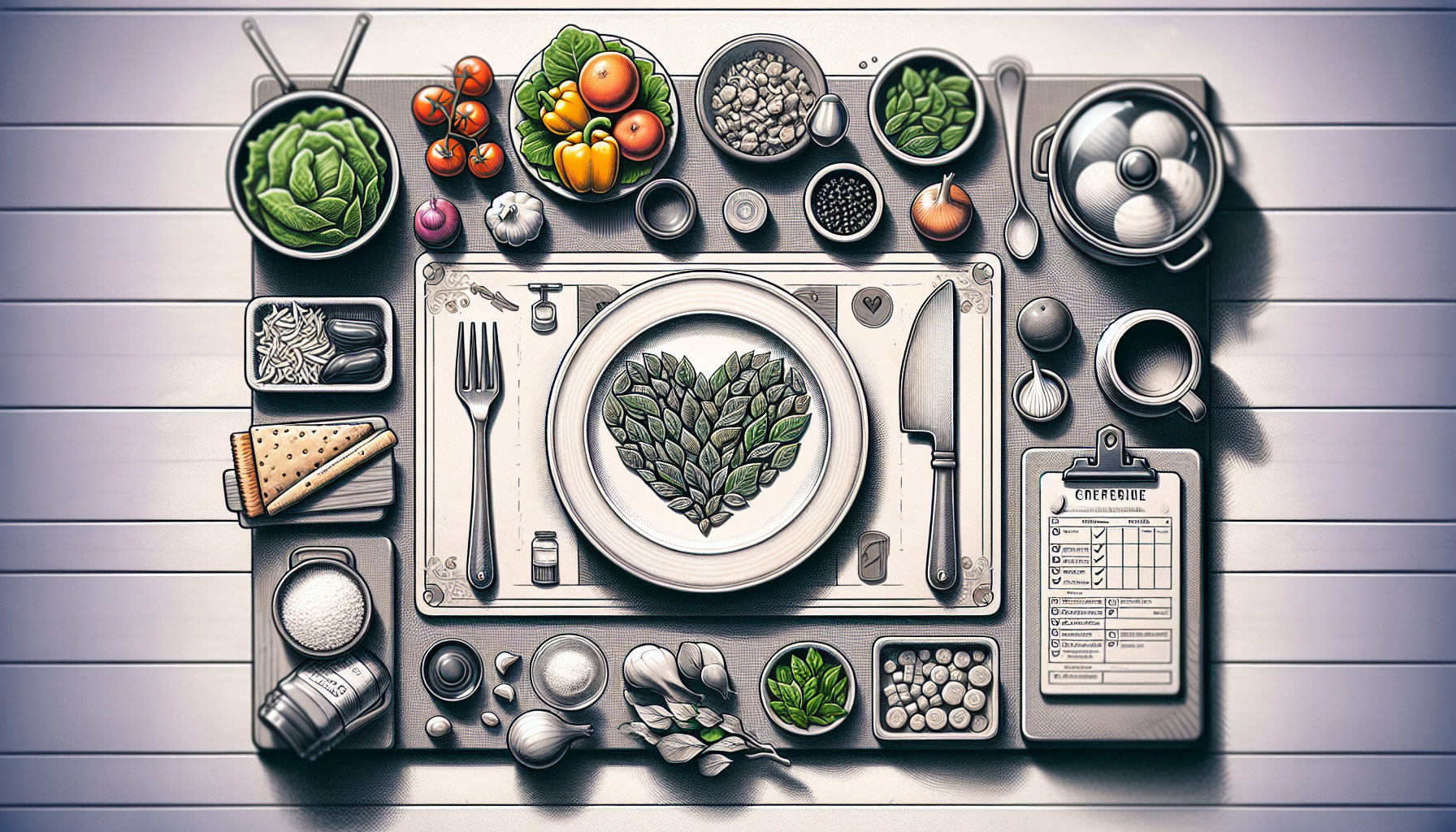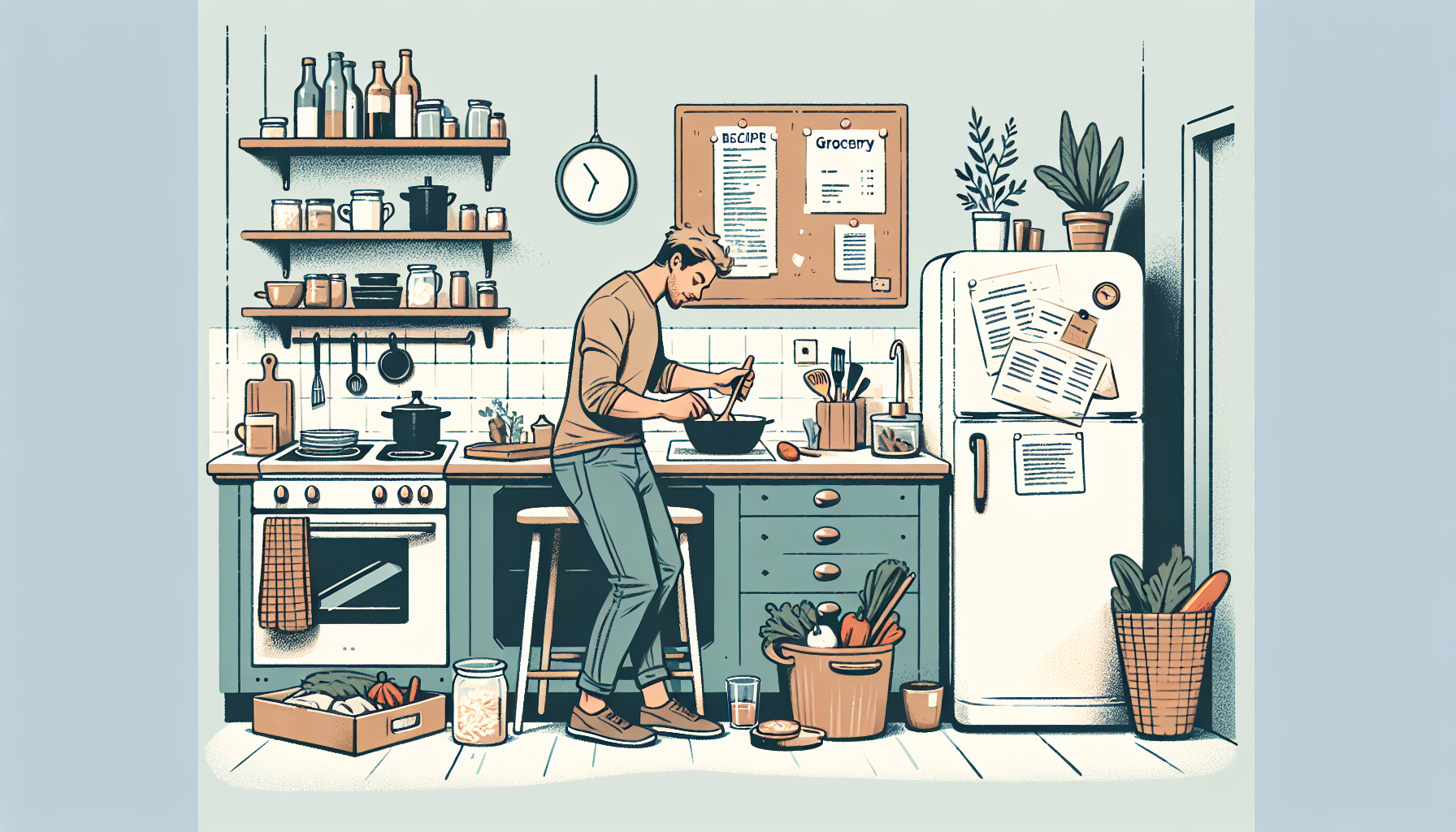Imagine the excitement of planning and preparing a meal for just one, tailored perfectly to your own tastes and preferences. Solo cooking can be a delightful and liberating experience, allowing you to experiment with flavors and indulge in your favorite ingredients without any compromises. But have you ever wondered, how does solo cooking actually impact your meal planning and grocery shopping routines? In this article, we will explore the fascinating ways in which solo cooking affects these aspects of your culinary journey, giving you a deeper understanding of the choices you make and their impact on your overall well-being. So grab a cup of tea and join us on this exploration of the world of solo cooking!

Effects of Solo Cooking
Increased Flexibility
When you cook for yourself, you have ultimate control over what you eat and when you eat it. Solo cooking allows you to be more flexible with your meal times and adapt to your schedule. Whether you’re a night owl or an early riser, you can prepare your meals whenever it suits you best. This flexibility also extends to the types of meals you can make. With no one else to please, you can experiment with different cuisines, ingredients, and flavors without any restrictions.
Focus on Personal Preferences
Cooking for yourself means you can cater to your own taste buds and dietary needs. You have the freedom to choose the ingredients you love and exclude the ones you don’t. Whether you follow a specific diet or have allergies, solo cooking allows you to prioritize your personal preferences. You can use more or less spices, add extra veggies, or even customize recipes to suit your unique palate. No more compromising on flavors or ingredients – it’s all about you and your preferences.
Greater Creativity
One of the joys of cooking alone is the opportunity to get creative in the kitchen. Without the need to please others, you can experiment with new recipes, techniques, and ingredients. Solo cooking gives you the freedom to think outside the box and create dishes that truly reflect your culinary imagination. You can delve into various cooking styles, try fusion cuisine, or even invent your own signature dishes. The possibilities are endless when you’re cooking for yourself, allowing you to unleash your inner chef and explore your creativity.
Meal Planning for Solo Cooking
Smaller Portion Sizes
One of the most significant adjustments when meal planning for solo cooking is managing portion sizes. Cooking for yourself means you can prepare meals in smaller quantities to match your needs. This not only reduces food waste but also allows you to savor each dish without any leftovers. You can scale down recipes accordingly or even invest in smaller-sized cookware and utensils. By planning for smaller portion sizes, you can ensure you have just enough food to satisfy your hunger without any unnecessary waste.
Leftovers Management
Handling leftovers can be a challenge when cooking solo, but with proper planning, it can become an opportunity for creative meals and time-saving convenience. By intentionally cooking larger batches of certain dishes, you can enjoy leftovers for future meals. Leftovers can be transformed into delicious lunch options or repurposed into new dishes with a few tweaks. Embrace the idea of cooking once and eating multiple times to make the most of your ingredients and minimize food waste.
Variety in Meals
Meal planning for solo cooking opens up exciting opportunities to explore a wide range of dishes. Since you’re not catering to anyone else’s preferences, you can experiment with different cuisines, flavors, and ingredients. Plan your meals to include a variety of proteins, grains, vegetables, and flavors to keep your taste buds excited and satisfied. Explore new recipes, try unique combinations, and indulge in foods you may not have considered before. With solo cooking, every meal can be an adventure in culinary exploration.
Grocery Shopping for Solo Cooking
Reduced Quantity of Ingredients
Solo cooking allows you to streamline your grocery list and purchase only what you need. With no need to account for multiple servings, you can buy smaller quantities of ingredients, reducing waste and saving money. Instead of buying a whole bag of potatoes or a large bunch of herbs, you can pick up just what you need for your single meal. This approach not only minimizes food waste but also ensures you always have fresh ingredients on hand without the burden of excess purchases.
Minimizing Food Waste
Cooking for yourself means you have to be mindful of food waste. To minimize waste, plan your meals in advance and consider the shelf life of ingredients. Opt for versatile ingredients that can be used in multiple recipes, reducing the likelihood of items going unused. Additionally, try freezing any excess ingredients or leftovers for future use. By being conscious of food waste, you not only help the environment but also save money by making the most of every ingredient purchased.
Meal Preparation Efficiency
When you’re cooking for one, efficiency becomes a top priority. Meal preparation can be simplified by organizing your shopping list and meal plan in advance. Preparing ingredients ahead of time and prepping meals in batches can save time and energy on busy days. Investing in kitchen tools like a good set of knives or a food processor can also help speed up the meal preparation process. With efficient grocery shopping and smart preparation techniques, solo cooking becomes a breeze.
Benefits of Solo Cooking
Healthier Eating Habits
Cooking for yourself allows you to take full control of your nutrition and make healthier choices. You can choose fresh, whole ingredients and control the amount of salt, sugar, and unhealthy fats in your meals. With solo cooking, you’re less likely to rely on processed and convenience foods, which are often high in calories and lacking in nutrients. By prioritizing your health and well-being through solo cooking, you can establish healthier eating habits that contribute to your overall well-being.
Cost Savings
Solo cooking can significantly impact your budget in a positive way. By purchasing ingredients in smaller quantities and minimizing food waste, you can save money on your grocery bills. You can also take advantage of sales and discounts without worrying about excessive quantities that may go unused. Additionally, by avoiding eating out or ordering takeout, you can reduce expenses while enjoying high-quality meals prepared in the comfort of your own home. Cooking for one can be both delicious and budget-friendly.
Enhanced Culinary Skills
When you cook for yourself, you have the opportunity to become a more skilled and confident home cook. Experimenting with flavors, developing new techniques, and adapting recipes to your own preferences can enhance your culinary skills. You can learn to master various cooking methods, refine your knife skills, and even delve into more complex recipes. Solo cooking encourages you to become more self-reliant in the kitchen and empowers you to create delicious meals from scratch. The more you cook for yourself, the more you’ll develop your own cooking style and become a culinary expert in your own right.

Challenges of Solo Cooking
Motivation and Inspiration
One of the challenges of solo cooking is finding motivation and inspiration to cook for yourself regularly. Without the company or encouragement of others, it’s easy to fall into a routine of eating quick and easy meals or relying on takeout. However, with a little effort, you can overcome this challenge. Explore food blogs, cookbooks, and online communities to discover new recipes and cooking techniques. Engage in meal planning and culinary experiments to keep your passion for cooking alive. Remember, solo cooking is an opportunity to treat yourself to delicious, homemade meals that can be tailored to your tastes and preferences.
Maintaining Fresh Ingredients
Buying fresh ingredients for solo cooking can be a balancing act. On one hand, you want to ensure you have a variety of fresh produce to create nutritious meals, but on the other hand, you have to be mindful of not letting ingredients go to waste. Plan your meals in advance and choose recipes that utilize similar ingredients to avoid spoilage. Consider buying ready-to-eat items like pre-washed greens or pre-cut vegetables to save time and extend the shelf life of perishable ingredients. With proper planning and storage techniques, you can maintain a steady supply of fresh ingredients for your solo cooking adventures.
Time Management
Managing your time efficiently can be a challenge when cooking for yourself. Without the support of others in the kitchen, tasks like chopping, cooking, and cleaning can take longer. However, with effective time management strategies, you can overcome this challenge and make solo cooking a seamless part of your routine. Plan your meals in advance to minimize last-minute decisions and save time during busy weekdays. Invest in kitchen tools like a slow cooker or pressure cooker, which can help you prepare meals with minimal effort. By prioritizing your time and dedicating specific slots for meal preparation, you can enjoy the process of solo cooking without feeling overwhelmed.
Strategies for Solo Cooking
Batch Cooking and Freezing
Batch cooking is a great strategy for solo cooking as it allows you to prepare larger quantities of food to be enjoyed over several meals. By cooking in bulk and then freezing individual portions, you can create a diverse variety of meals without spending too much time in the kitchen. Invest in quality food storage containers that are freezer-friendly and portion your meals accordingly. Label each container with the name and date of the dish to ensure you’re using the oldest meals first. This way, you’ll always have a home-cooked meal ready to enjoy, even on your busiest days.
Meal Prepping
Meal prepping is a time-saving technique that involves preparing ingredients or even whole meals in advance. Spend a few hours on the weekend chopping vegetables, marinating proteins, or assembling complete meals that can be easily reheated during the week. Portion out the ingredients in reusable containers or meal prep containers. This allows you to have meals that are ready to be cooked or require minimal effort. By dedicating time to meal prep, you can streamline your solo cooking experience and ensure you always have nutritious and delicious meals at your fingertips.
Recipe Adaptations
Don’t be afraid to adapt recipes to suit your solo cooking needs. Most recipes are designed for multiple servings, but with a few adjustments, you can make them perfect for one. Scale down the ingredients proportionally, or experiment by halving or even quartering the recipe to suit your desired portion sizes. You can also repurpose leftovers or excess ingredients in creative ways. For example, turn leftover grilled chicken into a flavorful sandwich or use extra vegetables in a stir-fry. By adapting recipes, you can maintain variety in your meals while ensuring you’re cooking exactly what you need.
